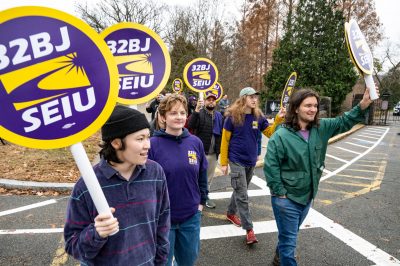
Workers at the Arnold Arboretum of Harvard University continued to rally for a wage increase on Saturday, more than two weeks after the expiration of their union contract.
Members of 32BJ Service Employees International Union, a property service union, saw their numbers grow from their first demonstration on Nov. 16 as they were joined by nearly 200 members of the community on Saturday, according to a statement from the union’s Regional Communications Manager Franklin Soults.
Negotiations between Harvard University and the union have been ongoing since August, according to an email from Paul Curran, managing director of labor and employee relations at Harvard, which was sent to Arboretum community members on Nov. 16.
Since August, the sides have reached tentative agreements for other topics, like adding a personal day for full-time staff, increasing clothing allowances and establishing a joint labor-management committee with quarterly meetings, according to the email from Curran.
“Having a more significant bump to our wages really would help create a buffer that would help improve the quality of life for them,” said Ben Kirby, an arborist at the Arboretum and shop steward for the workers.
The contract remains unratified as the union and Harvard deliberate over the proposed wage increase, according to the email.
Curran wrote that Harvard’s proposal is a “strong package” that will also allow the arboretum “to continue to attract and retain employees.” He also cited that their proposal is aligned with the standards of the Harvard Union of Clerical and Technical Workers.
The union, on the other hand, said the proposed wage increase is not enough to allow workers to “combat the skyrocketing housing costs that have made living near their workplace a near impossibility,” according to a Dec. 2 statement.
In addition to helping the workers with housing costs, Kirby said a wage increase would also be a way Harvard could show their gratitude for his crew’s work.
Kirby’s crew includes arborists, horticulturists and gardeners responsible for taking care of the massive 281-acre preserve. Kirby said his crew’s responsibilities involve pruning and bracing trees for not only the overall health of the preserve but also to “maintain safe spaces” for everybody at the arboretum including visitors, colleagues and students.
Rachel Lawlor, a horticulturist at the Arboretum and member of the workers’ union bargaining committee, said she agrees with the worker’s need for recognition, especially after their dedication during the pandemic.
“The Arboretum never even closed its gates for one day,” Lawlor said. “These were times we went to reduce staff members for social distancing, but we always had staff still on the grounds taking care of the collections.”
Lawlor also said a wage increase would acknowledge the expertise and training the workers, herself included, need to maintain the Arboretum as it is home to several collections of plants that require special care.
For the union, their next steps seem unclear as they evaluate the feelings within the group.
“We are just going action by action at this point,” Kirby said. “We try not to look too far ahead and are trying to be very deliberate in communicating with our crew and finding out how the crew feels about our progress or where they’d like to see more progress as we move forward.”
Soults wrote in an email that as time passes from the expired contract, a strike remains an option for the union for the future.
“Legally, it’s true that a strike is possible since the contract has expired,” Soults wrote. “Every possible action is still open for discussion … we are also very much open to continue talking with Harvard.”
While the future actions seem uncertain, the surrounding community’s support remains present.
Ora Gladstone, a frequent visitor of the Arboretum and avid advocate for the workers, called the surrounding neighborhood, Jamaica Plain, an activist community.
“The community will turn out in support of the workers for whatever the union decides they need,” Gladstone said. “We’ll attempt to increase those numbers so that the pressure continues to be on Harvard to do the right thing.”
Lawlor noted how thankful she and the rest of the workers were for the community’s support.
“Hopefully, if needed, they continue to support us,” she said.





















































































































